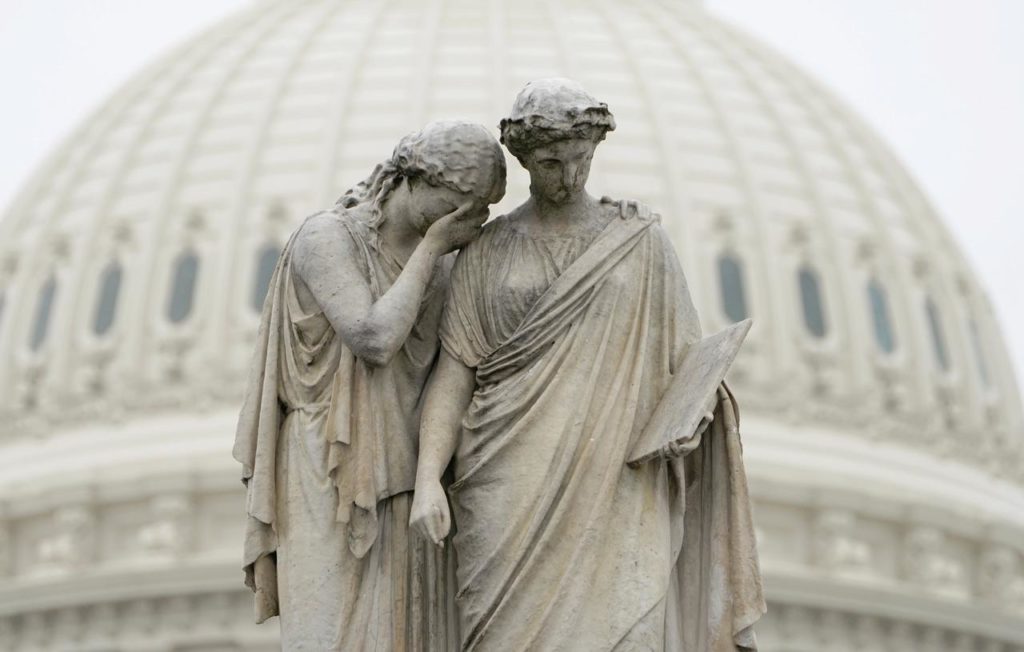Opinion: Giving Peace A Chance
Feb 25, 2022 | Shalini Rai
"Grief holds her covered face against the shoulder of History and weeps in mourning" as depicted at the Peace Monument in front of the U.S. Capitol in Washington, U.S.
As Russia’s plans for invading Ukraine were in the final stages on Thursday, UN Secretary General Antonio Guterres urged Russian President Vladimir Putin to ‘give peace a chance’.
A similar appeal was made in July 1969, by legendary singer-songwriter John Lennon in his iconic anti-war song ‘Give Peace A Chance’, co-written by wife Yoko Ono and associate Andre Perry. Most of us were not even born then but Lennon’s song has the longevity of a well-preserved botanical specimen. It is akin to the act of opening the pages of a yellowing journal which effortlessly brings forth memories and scents from long ago which still have the capacity to move us.
‘Give Peace A Chance’ made waves when it was released. It soon became the anthem of the American anti-war movement of the 1970s and inspired young people across the world to embrace peace and eschew war. It was the first solo single issued by Lennon, released while he was still a member of The Beatles. It peaked at number 14 on the Billboard Hot 100 and at number 2 on the British singles chart.
It remains as relevant today as it was 53 years ago in 1969.
But given the current global scenario, one wonders why the act of giving peace a chance is so difficult. Why does populist cinema chronicle the lives of war heroes more diligently over anti-war troubadours? Why are war movies treated with barely-concealed delight and appeals for peace relegated to the sidelines? Why do we have such ‘respect’ bordering on awe for all things military and ‘martial’ and ill-disguised dissatisfaction, contempt even, for peace activists and campaigners, who are readily labelled ‘troublemakers’ and ‘anti-nationals’ and ‘traitors’?
The answer to all this lies in the primacy of the deeply-embedded popular belief that there is something ‘strong’, ‘masculine’ and ‘aspirational’ about military personnel, military training and military ethos. It is indicative of the prominence that defence, military, armed forces — use whatever nomenclature you want — command among policymakers, lawmakers and the general (read impressionable) public.
The defence sector has remained an important focus for our government, cornering the largest share (13-14 percent) of allocation over the past few budgets. That is the case this year (2022-23) too, with INR 5,25,166 crore being allotted to the Ministry of Defence. In comparison, the education budget for 2022-23 has been allotted INR 1,04,278 crore while the education budget allocation for 2021-22 was INR 88,002 crore.
That comes to a difference of INR 420,888 between the defence budget and education budget in our country for financial year 2022-23.
The same script is followed in other countries as well, with young people, from an early age, being encouraged to be in awe of the military and military personnel. Our eulogies are confined to war heroes and war strategists. Our paeans are limited to bravery and sacrifice made in the name of annexation of one particular territory or the defence of another. Our tributes are reserved for those involved in war efforts and securing our borders from ‘enemies’ near and distant.
Had we reserved, earmarked, kept aside similar panegyrics for peace campaigners, anti-war activists, non-violence advocates, the world around us would have been a markedly different place. But for the most part, poets, writers, activists, artists who take up the cause of peace and love and harmony are either characterised as basket cases or branded anti-nationals or in extreme case, like with John Lennon, assassinated for, ironically, professing peace.
A careful look at pop culture, popular icons and iconography reveals that we accord disproportionate amounts of importance, respect even, to preserving and protecting a nation’s ‘sovereignty’, ‘patriotism’ and ‘nationalism’ when compared to working towards peace, abolishing nuclear weapons and fostering international harmony and cooperation.
That is why, it should come as no surprise when a so-called ‘stronger’ power like Russia, first provides ‘aid’ and ‘assistance’ to rebel factions in comparatively-smaller and ‘weaker’ Ukraine, then recognizes the ‘independence’ of two separatist eastern regions of that country and finally, rolls out the full force of its military might, in a prelude to the annexation/invasion of an independent country.
Things would have been radically different had we honoured our peace-espousing poets and writers with the same abandon and venerence that we have till now reserved for military figures and militant movements.
“War is Over”, as John Lennon would have said, “If you want it…..”
